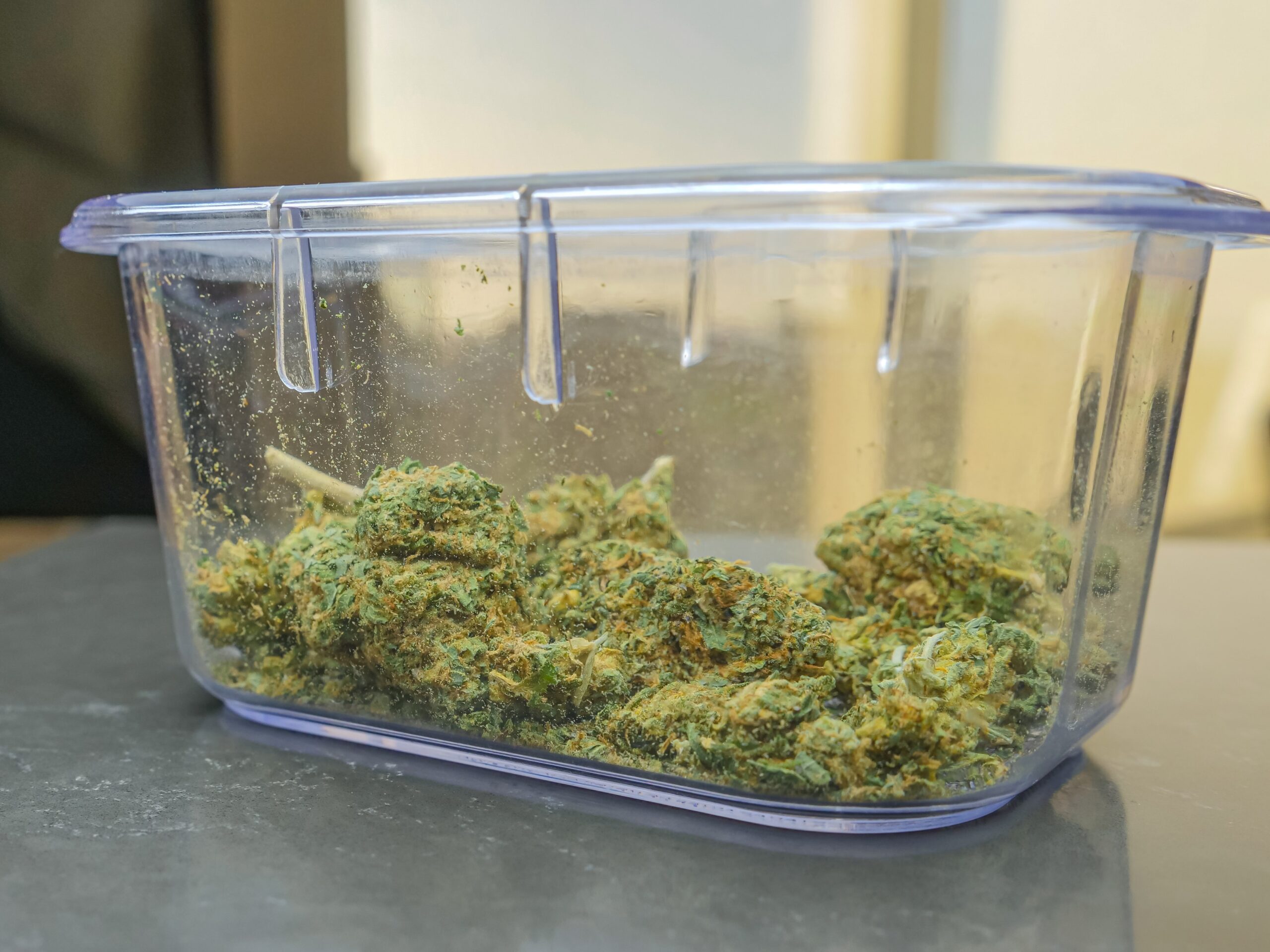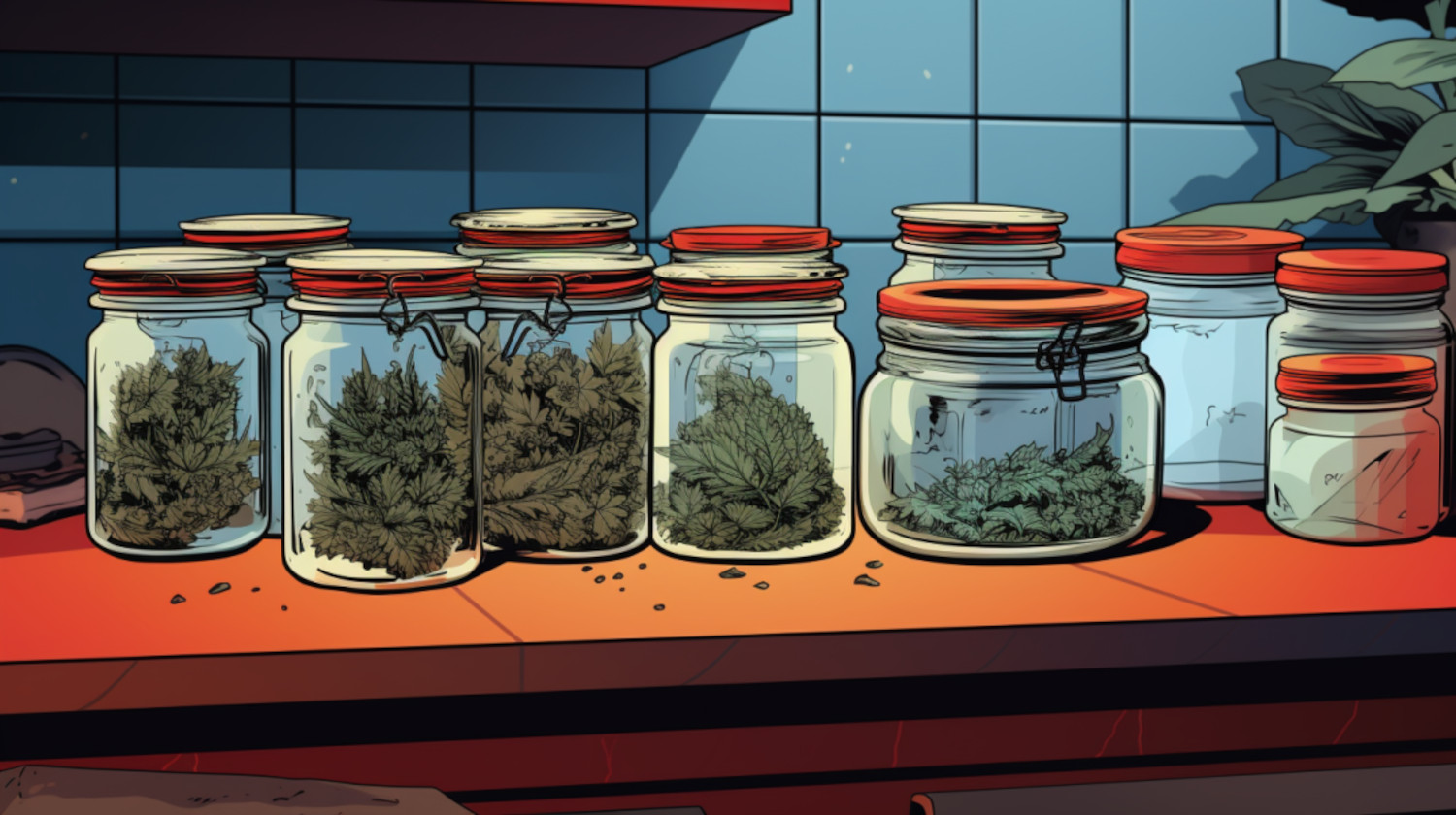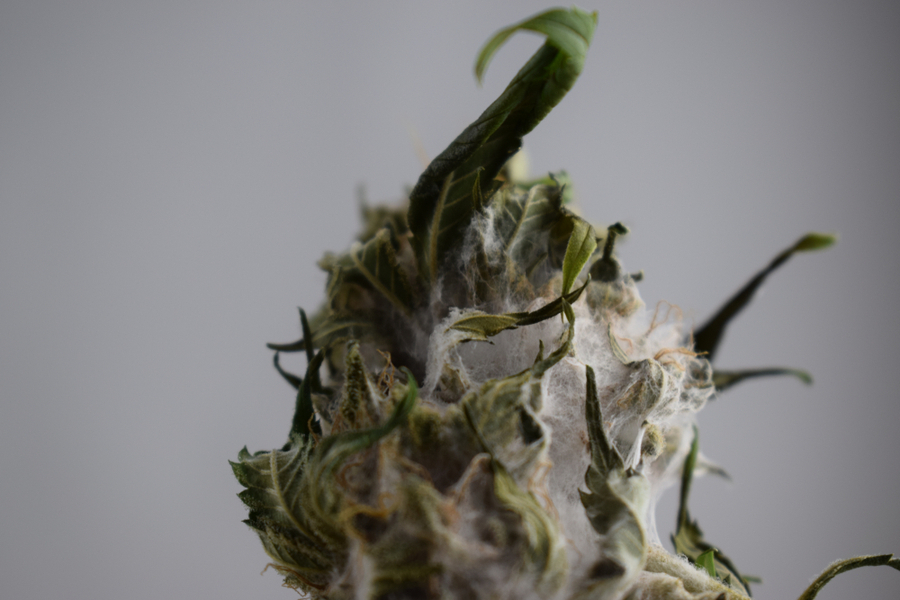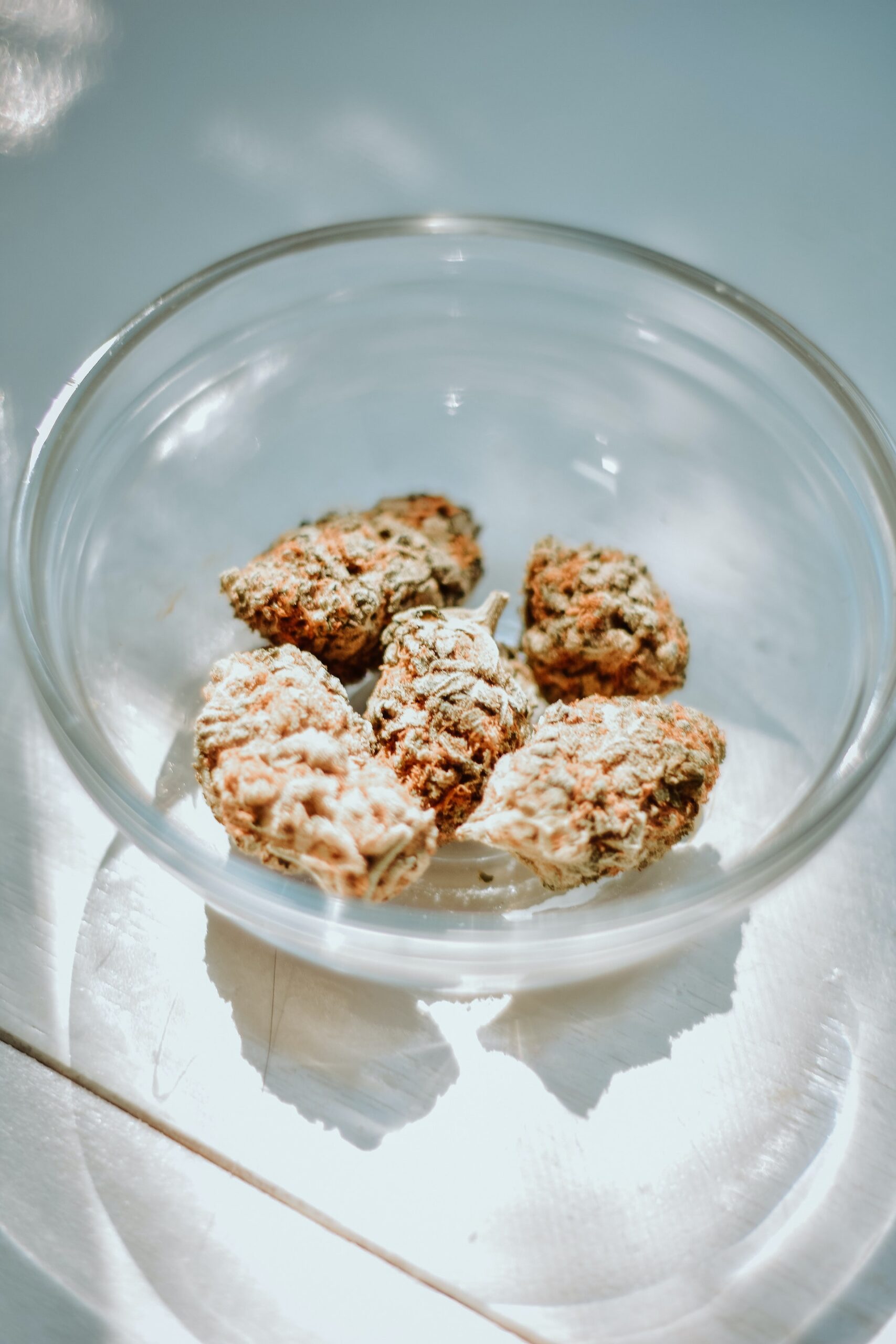In This Article
- Does Weed Expire?
- How Long Does Cannabis Stay Fresh?
- What Happens When Cannabis Expires?
- How to Tell if Cannabis Has Gone Bad
- Change in Aroma
- Change in Texture
- Change in Taste
- Mold Has Developed
- How to Check for Mold on Cannabis
- How to Stop Cannabis from Expiring
- Store Cannabis in an Airtight Container
- Pay Attention to Humidity
- Store Cannabis in a Cool, Dry, and Dark Place
- Maximizing Shelf Life of Your Cannabis
Key Takeaways
- Cannabis potency and flavor degrade over time, with significant reductions after one year.
- Proper storage—cool, dark, and airtight conditions—can extend cannabis freshness up to a year.
- Signs of expired cannabis include loss of aroma, dry texture, and the presence of mold.
Weed doesn't last forever. Just like everything else, it has a shelf life.
Even so, that doesn't mean cannabis goes bad or expires like other consumable products such as milk. As a matter of fact, weed can last quite a long time if stored properly.
In this article, we discuss the expiration dates of cannabis, how to tell if your flower has gone bad, and how to prolong its shelf life.
Does Weed Expire?
Sort of.
It doesn't "expire" in the sense that dairy or produce does: cannabis doesn’t become unsafe simply because it’s past its expiration date. But it does lose its potency and degrade in quality over time. And past a certain point, the loss of flavor and quality can change the potency, effects, and enjoyment you get from the product.
Generally speaking, weed's "expiration date" is roughly one year after it’s purchased. Past this point, it may become dry, taste musty, and lose some of the intoxicating effects you sought when you bought it.
While most consumers with “expired” weed are left with dried-out flowers (that can often be rehydrated), it is possible for old cannabis to become too moist.
Fresh cannabis contains some moisture within the buds. You've probably already noticed that fresh nugs are a little squishy and sticky to the touch. However, this hallmark of high-quality bud makes improperly stored cannabis susceptible to developing mold or other pathogens that are unsafe to consume and could lead to health problems such as headaches, vomiting, diarrhea, or even lung infections.
While moist weed left for long periods is more likely to start growing mold, unfortunately, this mold can begin developing at any time if the conditions are right. It doesn't have to be past weed's "expiration date" to do so. As such, you should always check your weed for mold, even if you recently purchased it from a dispensary.
So, how long does cannabis last?
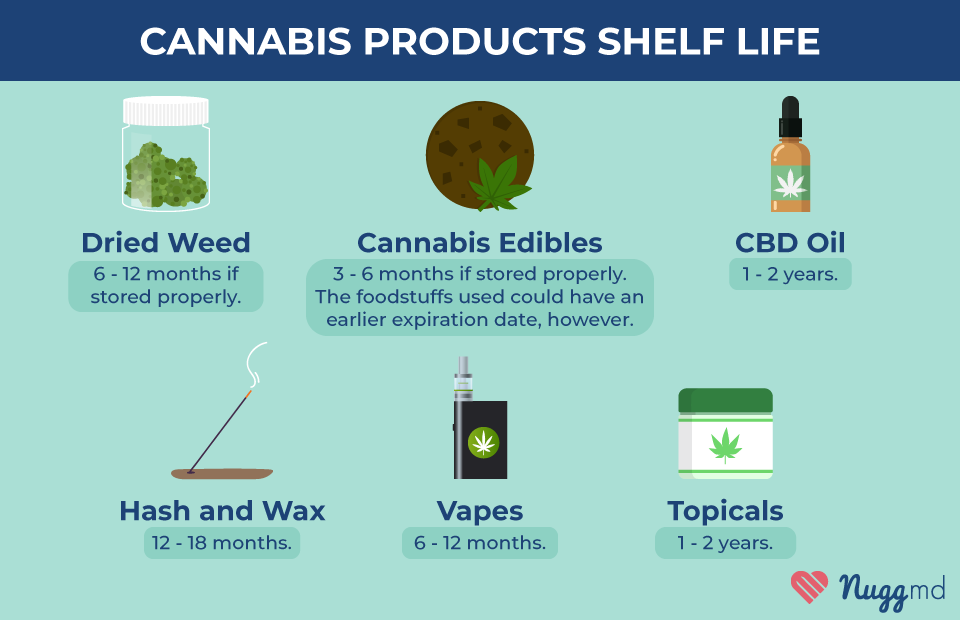
Beyond the potential for mold in moist flowers, cannabis doesn't expire like other food or consumable plant products. It'd be more apt to say that weed eventually becomes stale, like a potato chip.
Sure, you can eat a stale chip, but you don't really want to, and it will not be all that enjoyable. The same goes for smoking stale weed.
How Long Does Cannabis Stay Fresh?
Properly stored cannabis, kept in a cool, dark place within an airtight container, can maintain its potency and flavor for up to a year. Beyond this period, users may notice diminished effects. Storage conditions, environmental exposure, and other factors can all influence the longevity of cannabis.
What Happens When Cannabis Expires?
By and large, the main thing that happens when weed expires is a loss of smell and a harsher or mustier taste.
In most instances, old cannabis will still be intoxicating. But THC degrades to CBN over time, meaning the longer you wait to smoke your flower, the more THC you lose. Typically, it's best to consume cannabis within 3 - 6 months. After this, the concentration of THC begins to diminish.
According to research conducted by the United Nations, cannabis loses approximately:
- 16 percent of the original level of THC after one year,
- 16 percent of the original level of THC after two years,
- 16 percent of the original level of THC after three years,
- 16 percent of the original level of THC after four years,
So, how can you tell if your cannabis flower is past its unofficial expiration date?
How to Tell if Cannabis Has Gone Bad
Fortunately, it's relatively easy to notice when cannabis has expired. Here are the main things to look out for:
Change in Aroma
One of the most immediate ways to tell if weed has gone bad is if the aroma has changed (or even vanished entirely).
Freshly cured cannabis offers a very distinct smell: depending on the strain, you may smell skunk, diesel, or cheese. However, the aroma of expired weed can be severely diminished; it may become musty, or it could all but vanish.
Change in Texture
Along with the change in smell, the weed's texture is another giveaway that it is past its prime.
Freshly cured cannabis will feel sticky and have a little give to it. You'll be able to break and pull it apart. Expired weed, however, will be dry and dusty, to the point that it may crumble when you press on it or try to break it apart.
While overly dry cannabis can still be smoked (albeit with a less pleasant aroma and flavor), moldy weed should not be consumed. Doing so can put you at risk of becoming sick or developing severe medical complications such as lung infections.
Change in Taste
Like its aroma, cannabis has a distinct and well-loved flavor profile when consumed or smoked. The same cannot be said of expired weed, though. As the flower dries out, the flavor can be lost. And the lack of moisture can result in a harsh taste and increased throat irritation.
Mold Has Developed
Finally, the most important thing to look out for, which means the weed has gone bad, is the presence of mold. In most cases, you'll observe mold as any oddly discolored spot or white fuzz on or within the cannabis flower.
How to Check for Mold on Cannabis
Unfortunately, checking for mold on cannabis isn't always easy. It requires some care and attention to detail: we walk through the process in our article on All You Need to Know About Moldy Weed.
Several different types of mold grow on cannabis, with the most common being Powdery Mildew and Botrytis Blight (Gray Mold), which causes bud rot. As the name suggests, Powdery Mildew will look like white powder or fuzz on your cannabis.
No matter which mold has infected your cannabis or when you purchased the flower, the presence of mold can make the product unsafe to consume. In fact, a 2017 UC California, Davis study found bacteria and mold on 20 cannabis samples bought from medical cannabis dispensaries pre-recreational legalization.1
In addition, legal cannabis states may often recall cannabis products that have been found to be contaminated with mold. So, it's always best to look closely every time you stop by the dispensary and shop for brands that haven’t been recalled.
How to Stop Cannabis from Expiring
You can preserve weed and prevent mold development for longer in several ways. While it isn’t possible to preserve your flower indefinitely, here's how you can properly store your weed to extend its shelf life:
Store Cannabis in an Airtight Container
Plastic bags and open containers allow oxygen and light to reach your flower, increasing the rate at which it dries out.
By storing your cannabis flower in a glass container with an airtight seal – like a mason jar – you give your stash the best chance of lasting 6-12 months or longer.
Luckily, these kinds of containers are cheap and easy to find. You may find options available at your local dispensary.
Pay Attention to Humidity
Like excess oxygen, too much humidity will wreak havoc on the quality of your bud.
The ideal range you should shoot for is between 59 and 63% humidity. Above 63%, your cannabis will be too moist, creating an environment that allows mold spores and bacteria to thrive. Below this range, your weed will dry out faster, shortening its shelf life.
Fortunately, there are many products that can help you control the humidity in your cannabis containers—specifically, weed humidity packs and humidors.
Store Cannabis in a Cool, Dry, and Dark Place
Our last and arguably most important tip for preserving your weed is to keep your airtight container in a cool, dry, and dark place.
Excess temperature, moisture, and light can all shorten the shelf-life of your cannabis.
Keeping cannabis within direct sunlight for too long will cause it to lose its potency quickly. Research has been conducted that showed a 0.5% decrease in THC every hour cannabis flower was exposed to direct sunlight.
Excess temperature, especially when combined with excess moisture, will make molding to grow on your weed easier. However, this doesn't mean you should store your cannabis where it’s too cold, either. Placing your cannabis flower in a fridge, freezer, or other area that’s too cold can dry out the flower faster, resulting in a loss of flavor and potency.
The ideal temperature range when storing your cannabis is between 60 - 68°F.
Maximizing Shelf Life of Your Cannabis
Cannabis doesn’t expire in the traditional sense, but if you have flower that is more than 6-12 months old, you may begin to notice a loss of flavor, aroma, and potency.
To maximize the shelf life of your cannabis:
- Store cannabis in glass jars with tight seals to limit oxygen exposure.
- To prevent mold growth and preserve moisture, aim for a relative humidity of 59-63%.
- Store cannabis in a cool, dark location away from direct sunlight.
- Periodically check your stash for signs of degradation, such as changes in smell, texture, or appearance.
By adhering to these storage guidelines, you can ensure your cannabis remains potent and enjoyable for as long as possible.
- Thompson GR, Tuscano JM, Dennis M, et al. A microbiome assessment of medical marijuana. Clinical Microbiology and Infection. 2017;23(4):269-270. doi:https://doi.org/10.1016/j.cmi.2016.12.001 ↩︎
The information in this article and any included images or charts are for educational purposes only. This information is neither a substitute for, nor does it replace, professional legal advice or medical advice, diagnosis, or treatment. If you have any concerns or questions about laws, regulations, or your health, you should always consult with an attorney, physician or other licensed professional.

